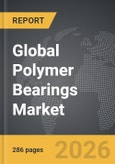Global Polymer Bearings Market - Key Trends & Drivers Summarized
What Are Polymer Bearings and Why Are They Gaining Popularity Across Industries?
Polymer bearings are bearings made from high-performance plastic materials, offering a lightweight and cost-effective alternative to traditional metal bearings. These bearings are increasingly popular in various industries due to their unique properties, including resistance to corrosion, low friction, and the ability to operate without the need for lubrication. Unlike metal bearings, which may require constant maintenance and can corrode over time, polymer bearings excel in applications where exposure to water, chemicals, or extreme environments is common. They are also quieter during operation and offer excellent wear resistance, making them suitable for applications with high wear-and-tear. The material composition of polymer bearings can be customized to meet specific performance criteria, such as temperature resistance, mechanical strength, and chemical compatibility, which has led to their widespread use in industries like automotive, aerospace, medical devices, and food processing. As industries prioritize lightweight and efficient solutions, polymer bearings have emerged as a reliable choice for reducing both maintenance costs and downtime.How Are Polymer Bearings Shaping Critical Industrial Applications?
Polymer bearings are increasingly being used in a range of industries due to their unique characteristics that outperform traditional metal bearings in specific applications. In the automotive industry, polymer bearings are valued for their lightweight properties, which contribute to the reduction of vehicle weight and, consequently, fuel efficiency. These bearings are used in various automotive components, including steering systems, seating mechanisms, and door hinges, where low friction and wear resistance are essential. Additionally, polymer bearings are gaining traction in aerospace applications, where weight reduction is critical for improving fuel efficiency and overall performance. Their resistance to wear, corrosion, and extreme temperatures makes them ideal for use in aircraft interiors, control systems, and actuators.In the medical device industry, polymer bearings play a significant role due to their biocompatibility and sterilization capabilities. Medical equipment often requires bearings that can function reliably in clean, sterile environments without the need for lubrication, and polymer bearings fit these requirements perfectly. They are used in devices such as surgical instruments, hospital beds, and diagnostic equipment. The food and beverage industry also benefits from polymer bearings, as they are corrosion-resistant and can withstand frequent washdowns, making them ideal for machinery in food processing plants. Additionally, polymer bearings are often used in conveyor systems and packaging equipment, where their low-maintenance and long-lasting properties improve production efficiency.
What Technological Advancements Are Expanding the Applications of Polymer Bearings?
Technological advancements in the materials used for polymer bearings are expanding their application scope and improving their performance. One notable development is the introduction of self-lubricating polymer materials, which eliminate the need for external lubrication, thus reducing maintenance costs and increasing the operational lifespan of machinery. This advancement has been particularly beneficial in industries such as food processing, where the risk of contamination from lubricants must be minimized. The development of high-temperature-resistant polymers has also widened the application range for polymer bearings in sectors like aerospace, automotive, and industrial machinery, where components must withstand extreme heat without losing their integrity.Additionally, reinforced polymer composites, which incorporate materials such as carbon fiber or glass fibers, are offering enhanced mechanical properties, including greater strength and rigidity. These composites are allowing polymer bearings to be used in more demanding environments that were traditionally reserved for metal bearings. Furthermore, advancements in 3D printing and additive manufacturing technologies are enabling the production of custom-designed polymer bearings with complex geometries, tailored for specific applications. This capability allows manufacturers to optimize the performance of the bearings for unique operating conditions, further enhancing the appeal of polymer bearings in specialized industries.
What Factors Are Driving the Growth of the Polymer Bearings Market?
The growth of the global polymer bearings market is driven by several key factors, all linked to the increasing demand for high-performance, low-maintenance solutions in various industries. One of the primary drivers is the rising demand for lightweight materials in the automotive and aerospace industries. As manufacturers aim to improve fuel efficiency and reduce emissions, polymer bearings offer a solution by reducing the overall weight of vehicles and aircraft without compromising performance. Another significant growth driver is the low-maintenance nature of polymer bearings, which is particularly appealing to industries that prioritize cost-saving and reduced downtime. The self-lubricating properties of many polymer bearings eliminate the need for constant lubrication, making them a more reliable and cost-effective alternative to metal bearings.Additionally, the growing focus on sustainability and environmentally friendly manufacturing processes is contributing to the adoption of polymer bearings. Since these bearings often require no external lubricants, they reduce the environmental impact associated with lubricant disposal and contamination risks. The increasing use of polymer bearings in harsh environments, such as those involving exposure to chemicals, moisture, and extreme temperatures, is also driving market growth. These bearings are well-suited to operate in challenging conditions where metal bearings might corrode or fail. Furthermore, the advancement in polymer material science, including the development of stronger, more durable polymers and composite materials, is expanding the range of applications for polymer bearings, further propelling market growth. As industries continue to evolve and demand more efficient, durable, and cost-effective solutions, polymer bearings are expected to see continued growth across multiple sectors.
Report Scope
The report analyzes the Polymer Bearings market, presented in terms of market value (US$ Thousand). The analysis covers the key segments and geographic regions outlined below.- Segments: Material (Phenolics, Acetal, Nylon, Teflon, UHMWPE, Other Materials); End-Use (Automobile, Textile, Packaging, Medical & Pharmaceuticals, Other End-Uses).
- Geographic Regions/Countries:World; United States; Canada; Japan; China; Europe (France; Germany; Italy; United Kingdom; Spain; Russia; and Rest of Europe); Asia-Pacific (Australia; India; South Korea; and Rest of Asia-Pacific); Latin America (Argentina; Brazil; Mexico; and Rest of Latin America); Middle East (Iran; Israel; Saudi Arabia; United Arab Emirates; and Rest of Middle East); and Africa.
Key Insights:
- Market Growth: Understand the significant growth trajectory of the Phenolics Material segment, which is expected to reach US$6.4 Billion by 2030 with a CAGR of a 7.1%. The Acetal Material segment is also set to grow at 7.1% CAGR over the analysis period.
- Regional Analysis: Gain insights into the U.S. market, valued at $3.4 Billion in 2024, and China, forecasted to grow at an impressive 10.5% CAGR to reach $4.8 Billion by 2030. Discover growth trends in other key regions, including Japan, Canada, Germany, and the Asia-Pacific.
Why You Should Buy This Report:
- Detailed Market Analysis: Access a thorough analysis of the Global Polymer Bearings Market, covering all major geographic regions and market segments.
- Competitive Insights: Get an overview of the competitive landscape, including the market presence of major players across different geographies.
- Future Trends and Drivers: Understand the key trends and drivers shaping the future of the Global Polymer Bearings Market.
- Actionable Insights: Benefit from actionable insights that can help you identify new revenue opportunities and make strategic business decisions.
Key Questions Answered:
- How is the Global Polymer Bearings Market expected to evolve by 2030?
- What are the main drivers and restraints affecting the market?
- Which market segments will grow the most over the forecast period?
- How will market shares for different regions and segments change by 2030?
- Who are the leading players in the market, and what are their prospects?
Report Features:
- Comprehensive Market Data: Independent analysis of annual sales and market forecasts in US$ Million from 2024 to 2030.
- In-Depth Regional Analysis: Detailed insights into key markets, including the U.S., China, Japan, Canada, Europe, Asia-Pacific, Latin America, Middle East, and Africa.
- Company Profiles: Coverage of players such as BNL Ltd., Boston Gear LLC, Dotmar Engineering Plastic Products, Igus Inc., Kashima Bearings, Inc. and more.
- Complimentary Updates: Receive free report updates for one year to keep you informed of the latest market developments.
Some of the 34 companies featured in this Polymer Bearings market report include:
- BNL Ltd.
- Boston Gear LLC
- Dotmar Engineering Plastic Products
- Igus Inc.
- Kashima Bearings, Inc.
- Kilian Manufacturing
- KMS Bearings, Inc.
- Oiles Corporation
- Saint-Gobain S.A.
- SKF
This edition integrates the latest global trade and economic shifts into comprehensive market analysis. Key updates include:
- Tariff and Trade Impact: Insights into global tariff negotiations across 180+ countries, with analysis of supply chain turbulence, sourcing disruptions, and geographic realignment. Special focus on 2025 as a pivotal year for trade tensions, including updated perspectives on the Trump-era tariffs.
- Adjusted Forecasts and Analytics: Revised global and regional market forecasts through 2030, incorporating tariff effects, economic uncertainty, and structural changes in globalization. Includes historical analysis from 2015 to 2023.
- Strategic Market Dynamics: Evaluation of revised market prospects, regional outlooks, and key economic indicators such as population and urbanization trends.
- Innovation & Technology Trends: Latest developments in product and process innovation, emerging technologies, and key industry drivers shaping the competitive landscape.
- Competitive Intelligence: Updated global market share estimates for 2025, competitive positioning of major players (Strong/Active/Niche/Trivial), and refined focus on leading global brands and core players.
- Expert Insight & Commentary: Strategic analysis from economists, trade experts, and domain specialists to contextualize market shifts and identify emerging opportunities.
Table of Contents
Companies Mentioned (Partial List)
A selection of companies mentioned in this report includes, but is not limited to:
- BNL Ltd.
- Boston Gear LLC
- Dotmar Engineering Plastic Products
- Igus Inc.
- Kashima Bearings, Inc.
- Kilian Manufacturing
- KMS Bearings, Inc.
- Oiles Corporation
- Saint-Gobain S.A.
- SKF
Table Information
| Report Attribute | Details |
|---|---|
| No. of Pages | 286 |
| Published | February 2026 |
| Forecast Period | 2024 - 2030 |
| Estimated Market Value ( USD | $ 13.3 Billion |
| Forecasted Market Value ( USD | $ 19.9 Billion |
| Compound Annual Growth Rate | 6.9% |
| Regions Covered | Global |









